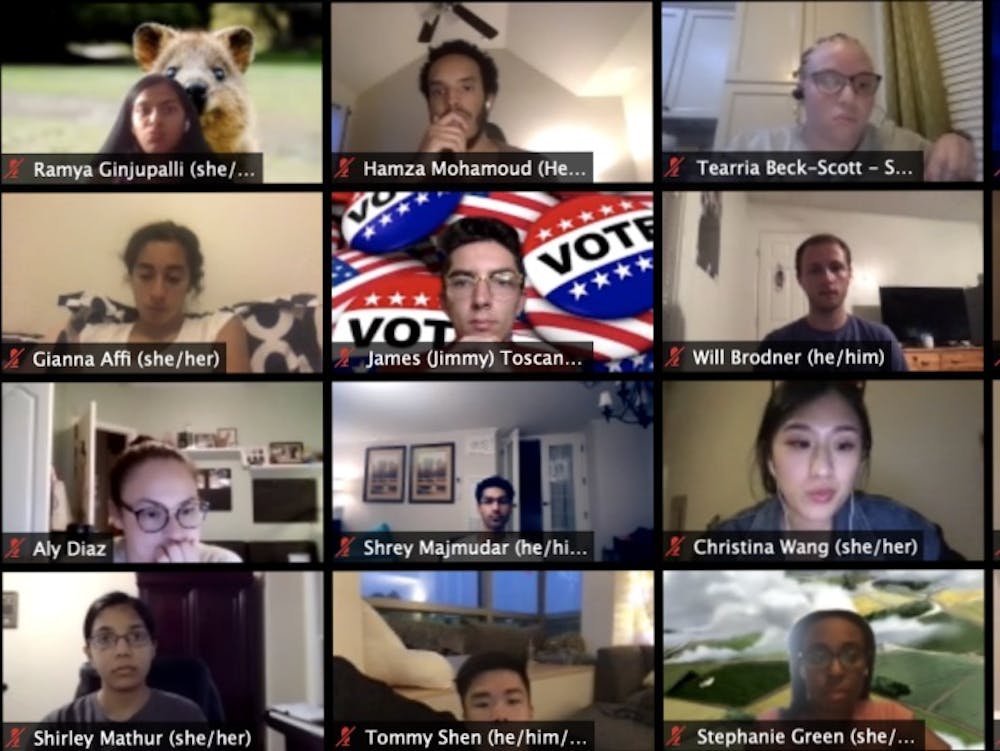Following the creation of Duke Student Government caucuses during the 2018-19 academic year, the caucuses have expanded to better represent the Duke student body.
DSG caucuses were formed as a way for DSG members to discuss and present ideas that advocate for specific campus demographics. Citing criticism that DSG did not heed all voices on campus, the DSG Senate changed its bylaws in 2018 to allow the creation of caucuses.
When the caucuses were formed, there were two proposed: the First-Generation/Low-Income Caucus and LGBTQIA+ Caucus. Today, DSG is home to seven caucuses, including those two. At Wednesday’s Zoom Senate meeting, each caucus was given the opportunity to discuss their previous work and possible plans for the 2020-21 academic year, though not all had representatives present.
The Latinx Caucus, represented by senior Aly Diaz, vice president of Durham and regional affairs, worked throughout the 2019-20 academic year to “uplift the voices of the Latinx community,” Diaz said.The caucus worked to bridge the divide between Latinx-identifying international students and those from the United States, and hosted the first Latinx photoshoot in Duke history.
The Asian American and Pacific Islanders Caucus, represented by junior Christina Wang, vice president of equity and outreach, is working to “boost representation of AAPI faculty and guest speakers,” Wang said. The caucus hosted a symposium during Blue Devil Days in 2019 and plans to move forward in making the symposium a staple of the weekend. They hope to “draw more attention to AAPI faculty in the humanities,” as well as “highlight the experiences of AAPI groups that tend to be erased more often,” Wang said.
The disability caucus, represented by sophomore Senator Dawei Gao, works to “help address disability justice,” Gao said. During the 2019-20 academic year, they worked in conjunction with the Duke Disability Alliance to attempt to have transcription technology incorporated into Zoom, among other projects.
The mental health caucus, represented by junior Shrey Majmudar, vice president of academic affairs, works with other mental health undergraduate student organizations to promote mental health advocacy, Majmudar said. The caucus is open to any DSG member interested in general mental health, and “is constantly meeting with administrators and student groups [to assist in its work],” Majmudar said.
Although executives from the First-Generation/Low-Income Caucus did not attend the meeting, caucus member Gao detailed a project that is working to “pair QuestBridge Scholars at [Duke] with low-income, high-achieving students in high schools around the Durham area.”
Representatives from the International and LGBTQIA+ Caucuses were also not present.
Other Business:
Executive Vice President Dina Qiryaqoz presented open positions on the Senate Judiciary Committee. Qiryaqoz said committee members work to “evaluate allegations of misconduct and referrals for removal from the Senate” and assume responsibility for the nomination of the Chief Justice and Associate Justices.
The Senate nominated Gao and six others—sophomore Senators Cynthia Dong, Devan Desai, Sawyer O’Keefe and Tommy Shen and seniors Senator James Toscano Jr. and Danny Wu—to the committee. The nominations were confirmed unanimously.
Sophomore Drew Flanagan, chair of the Student Organization Finance Committee, presented 12 SOFC positions, all of which were confirmed unanimously.
DSG recognized one new student group, the Duke Medical Ethics Journal, which will publish frequently throughout the year with “new debriefs relating to the intersection between medicine and ethics,” Flanagan said. According to Flanagan, the group will fill a new “niche” on campus and add “community and value” to current campus organizations.
Get The Chronicle straight to your inbox
Sign up for our weekly newsletter. Cancel at any time.

